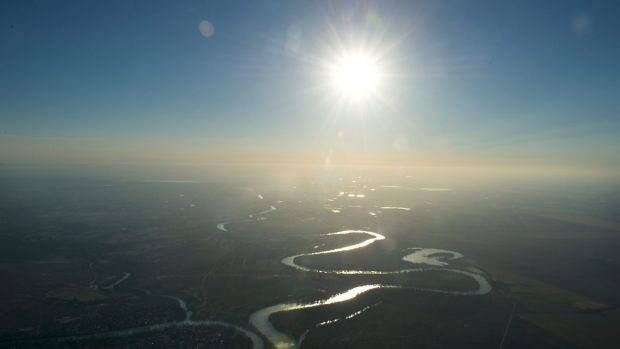Calls mount for royal commission into controversial Murray-Darling water buybacks

Pressure continues to mount on the Morrison government over controversial water buybacks in 2017, with calls for both a royal commission and an immediate explanation about why officials dealt with a company domiciled in a tax haven.
Labor has given Scott Morrison a deadline of Monday to address questions about the 2017 water buybacks, and has not ruled out establishing a royal commission probing the various transactions in the event Bill Shorten wins the 18 May contest.
On Sunday the Centre Alliance senator Rex Patrick declared a royal commission was the only way to compel sufficient evidence to make informed judgments about the water buybacks. Patrick also told the ABC he was “absolutely disturbed that the Australian government has been dealing with a company that is domiciled in a tax haven”.
“We need to look very carefully at any transactions that we conduct with taxpayers’ monies with companies who are domiciled in tax havens,” Patrick said.
The former Nationals leader Barnaby Joyce, now a backbencher, signed off on $200m in water buybacks in 2017. The process took place without an open tender and there has been criticism of the reliability of the water purchased, although the department of agriculture and water resources says it undertook “due diligence activities”.
Joyce, who has not answered questions about the process from some media outlets in recent days on the basis that he’s been out of mobile range, texted in to a journalist on the ABC’s Insiders program on Sunday morning to defend the 2017 process.
According to the text message read out on air, Joyce said: “You have to go to the market and purchase what people are willing to sell. It wasn’t compulsory buybacks. It was voluntary. I insist that I was not involved in the negotiations”.
The Department of Agriculture and Water Resources, in a highly unusual public statement released during the caretaker period, argues the “purchase represented a unique opportunity to secure a significant volume of water in a catchment of particular strategic importance to achieving the triple-bottom line outcomes of the Murray-Darling Basin Plan”.
Guardian Australia has spent several months looking into the sale of water, and why the government chose to buy water from a company called Eastern Australia Agriculture for $79m when it had rejected it twice before. No clear answers have emerged, other than that EAA was a willing seller and its investors were keen to realise their investment.
Asic records show that the company was established in 2007 when the water trading market was being set up, making water rights potentially very valuable.
The reforms allowed water rights to be traded separate to land, and provided a way for the government to buy back water for the environment.
In 2008 EAA bought two properties, Kia Ora and Clyde, just south of Cubbie Station, in the St George/Dirranbandi region of Queensland. Both had extensive water rights.
EAA’s ultimate holding company between 2008 until the time of the water sale was Eastern Australia Irrigation, which is domiciled in the Cayman Islands.
The early directors of EAA included Angus Taylor, who is now the energy minister, but who was at that time was a consultant specialising in agricultural investments.
Taylor’s spokesman says the minister has never had a direct or indirect financial interest in EAA or any associated company, and “concluded all association with EAA and related companies prior to entering the parliament”.
The statement from a spokesman says the energy minister had no knowledge of the federal government’s water buyback from EAA until after it occurred, and Taylor received no benefit from the transaction.
Both Patrick and the Greens senator Sarah Hanson-Young on Sunday called on the Morrison government to release documents that would shed light on the water buybacks in un-redacted form.
Hanson-Young told Sky News: “We need to have a full independent audit of how this was done, was it value for money? But we need the documents that have been tabled in the Senate, un-redacted.”
Patrick argued the only vehicle able to get to the bottom of the controversy was a royal commission, “someone that can examine both what’s happened inside government, but also subpoena documents and summon witnesses, including ministers, including members of the companies involved, and look to the transactions that took place”.
“We need to make sure that this is a completely transparent arrangement and that everything has been above board. This is a matter of public confidence and there is apprehension all around this country in relation to the Murray-Darling Basin Plan and its execution.”
Patrick said Joyce needed to answer questions about the decision-making that led to the water purchases and he said “there’s questions over the value of the water” because the price paid was high.
Hanson-Young wrote to Shorten on Sunday asking Labor to support a royal commission. “It has been widely reported that these water purchases may not have achieved value for money, and that the water purchased may not have been returned to the river,” Hanson-Young’s letter to Shorten says.
“This is of great concern to all Australians, especially in my home state of South Australia, where what happens upstream affects us here. Our river is drying up after years of mismanagement and corruption. This must be addressed.”
In defending the transaction, the department says it undertook due diligence activities in investigating the proposal, “including checking the validity of the licences on offer; and obtaining commercial water valuation advice, independent advice on the possible socio-economic impacts, and advice from the state government, the MDBA and the Commonwealth Environmental Water Holder”.
“The water purchase was consistent with Commonwealth procurement rules and paid at a fair market rate, as informed by independent market valuation. Information about the purchase of the water is listed on AusTender, the Department’s website and on the Senate website to produce documents.”
Originally published by The Guardian, 21 April 2019.
